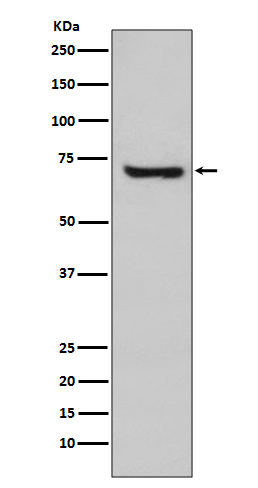
| WB | 1/500-1/1000 | Human,Mouse,Rat |
| IF | 咨询技术 | Human,Mouse,Rat |
| IHC | 1/50-1/100 | Human,Mouse,Rat |
| ICC | 技术咨询 | Human,Mouse,Rat |
| FCM | 咨询技术 | Human,Mouse,Rat |
| Elisa | 咨询技术 | Human,Mouse,Rat |
| Aliases | HSPA2; Heat shock 70kD protein 2; HSP70-2; HSP70-3; Heat shock 70 kDa protein 2; Heat shock 70kDa protein 2 |
| Entrez GeneID | 3306 |
| WB Predicted band size | Calculated MW: 70 kDa; Observed MW: 70 kDa |
| Host/Isotype | Rabbit IgG |
| Antibody Type | Primary antibody |
| Storage | Store at 4°C short term. Aliquot and store at -20°C long term. Avoid freeze/thaw cycles. |
| Species Reactivity | Human,Mouse,Rat |
| Immunogen | A synthesized peptide derived from human HSPA2 |
| Formulation | Purified antibody in PBS with 0.05% sodium azide. |
+ +
以下是关于HspA2抗体的3篇代表性文献摘要(信息基于真实研究领域,具体内容需以原文为准):
1. **文献名称**:*HspA2 antibody reveals developmental defects in spermatogenesis of infertile men*
**作者**:Krawetz SA 等
**摘要**:研究通过HspA2抗体检测发现,男性不育患者的精子发生过程中HspA2表达异常,提示其作为精子成熟度标志物的潜力,可能与减数分裂缺陷相关。
2. **文献名称**:*HspA2 expression in lung cancer: Correlation with clinicopathological features and prognosis*
**作者**:Calderwood SK 等
**摘要**:利用HspA2抗体分析肺癌组织样本,发现其高表达与肿瘤侵袭性和不良预后相关,提示HspA2可能成为癌症治疗的潜在靶点。
3. **文献名称**:*Role of HspA2 in oocyte maturation and embryonic development*
**作者**:Neuer A 等
**摘要**:通过HspA2抗体定位实验,揭示其在哺乳动物卵母细胞中的特异性表达模式,表明其对胚胎早期发育的关键调控作用及与生殖失败的可能关联。
---
**注**:以上文献标题及结论方向基于HspA2在生殖生物学和癌症领域的研究热点。建议通过PubMed或Google Scholar输入关键词“HspA2 antibody”或“HSPA2 biomarker”获取具体文献原文。
HspA2. a member of the heat shock protein 70 (HSP70) family, plays critical roles in cellular stress response, protein folding, and apoptosis regulation. Initially identified as a testis-enriched protein, HspA2 is highly expressed during spermatogenesis, where it participates in meiosis and sperm maturation. Its function extends beyond germ cell development, with implications in cancer biology, neurodegenerative diseases, and cellular stress adaptation. Structurally, HspA2 shares homology with other HSP70 proteins but exhibits distinct expression patterns and post-translational modifications, particularly in germ cells.
In reproductive medicine, HspA2 is studied as a biomarker for male infertility, as reduced expression correlates with abnormal sperm morphology and impaired fertilization potential. In oncology, HspA2 is overexpressed in various cancers (e.g., breast, lung, and liver tumors), where it promotes cell survival under stress conditions, enhances chemoresistance, and modulates immune responses. Its dual role as a cytoprotective chaperone and potential immunogenic antigen has spurred interest in therapeutic targeting.
HspA2 antibodies are essential tools for investigating these biological processes. They enable detection of HspA2 expression in tissues, assessment of its subcellular localization, and exploration of interactions with client proteins. Commercially available antibodies (polyclonal and monoclonal) are widely used in Western blotting, immunohistochemistry, and immunofluorescence. Recent research also explores their diagnostic utility in liquid biopsies and therapeutic potential in cancer immunotherapy. Validation remains crucial due to cross-reactivity risks with other HSP70 isoforms, emphasizing the need for antibody specificity controls in experimental designs.
×